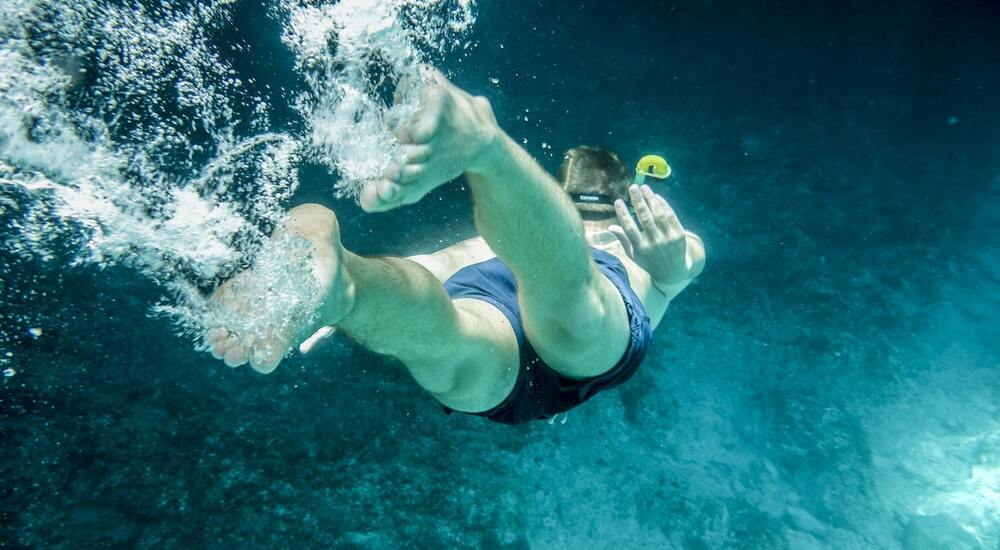Beginner snorkelers may be curious as to whether there is a weight restriction. Although snorkeling doesn’t have a set weight limit for snorkeling, it’s essential to realize that the activity requires physical exertion, so your weight may limit your enjoyment. Snorkeling can be strongly impacted by weight, which can alter buoyancy, energy use, and general comfort. We’ll talk about how weight affects snorkeling in this blog article and offer advice on how heavier people can maximize their snorkeling experience.
When snorkeling, buoyancy is a crucial consideration. It is the capacity to float on the water’s surface freely. Their body weight significantly influences a person’s buoyancy. Neutral buoyancy, the preferred state for snorkeling, will be more difficult for an overweight person to achieve. This is because having a higher overall density from having more body fat makes it more difficult to float on the water’s surface. On the other hand, underweight people may find it challenging to maintain their buoyancy because they lack the requisite body mass.
Another factor that can impact snorkeling is energy expenditure. Snorkeling requires a certain amount of physical exertion, including swimming against currents and tides. The more weight an individual carries, the more energy they expend to move through the water. This increased energy expenditure can lead to fatigue and reduce the time an individual can spend snorkeling comfortably.
Carrying extra weight can also impact an individual’s comfort while snorkeling. Wearing a wetsuit, fins, and other snorkeling gear can already be uncomfortable, and adding excess weight to the equation can exacerbate this discomfort. The added weight can pressure the joints and muscles, increasing fatigue and pain.
Weight might also impact a person’s snorkeling safety. Carrying too much weight might make it difficult to swim or stay afloat, making it harder to reach the surface in an emergency. An increased risk of cramping and other ailments might also result from carrying extra weight while snorkeling.
Snorkeling is significantly influenced by weight. It may impact safety, comfort, buoyancy, and energy usage. Therefore, people need to consider their weight before participating in snorkeling activities. People may need to take more precautions or modify their equipment if they are overweight or underweight to have a safe and comfortable snorkeling experience.
It is worth noting that even if you are overweight, you can still enjoy snorkeling. However, you can do a few things to make your experience more comfortable and enjoyable. Here are some tips:
Use a Buoyancy Aid
Heavier individuals may find it more challenging to float while snorkeling. Consider using a buoyancy aid, such as a snorkel vest or a life jacket, to assist you in staying afloat. This will allow you to conserve energy and enjoy the underwater scenery without worrying about staying afloat.
Choose the Right Snorkeling Gear
Having the right snorkeling gear is crucial for heavier individuals. The snorkeling mask should fit well and form a seal around the face to prevent water from seeping in. A full-face mask might be more comfortable for individuals with larger faces, as it provides a broader field of view and allows for easier breathing through the mouth and nose.
Selecting a wetsuit that fits correctly for snorkelers with larger bodies
A wetsuit should be snug but not too tight, allowing for ease of movement and insulation. A well-fitting wetsuit will help keep the snorkeler warm in colder waters and protect against abrasions from rocks and other underwater objects.
Additionally, it’s essential to get a properly fitting snorkel and mask. A mask that is too small or tight can cause discomfort and leak water, while a snorkel that is too short may require you to hold your breath more often, causing you to tire more quickly. It’s also a good idea to consider getting fins that provide extra support and propulsion, making swimming through the water easier.
Practice Proper Breathing Techniques
Breathing is a critical aspect of snorkeling and is significant for heavier individuals. If you are carrying extra weight, you may need to take more frequent breaths, and it’s essential to focus on your breathing technique to ensure that you stay in breath quickly.
Before you begin snorkeling, take a few deep breaths and focus on breathing slowly and deeply throughout the experience. Take your time and pace yourself, taking breaks as needed. It’s also important to be aware of your body and any signs of fatigue or shortness of breath and to surface if necessary.
Know Your Limits
It is critical to listen to your body and not overwork yourself. Snorkeling can be physically demanding, so take pauses and relax when needed.
If you start to feel tired or short of breath, take a break and rest for a few minutes. Refrain from pushing through the fatigue, which can lead to exhaustion and potentially dangerous situations.
Choose the right location
When choosing a location for snorkeling, it’s essential to consider the conditions and difficulty level. Some sites may be more challenging for heavier individuals, especially if they require a lot of swimming or have strong currents.
Look for locations that offer calm and shallow waters where you can comfortably swim and explore without feeling overwhelmed. Check the weather forecast before you go, as choppy seas or high winds might make snorkeling more difficult.
Snorkel with a Buddy or Guide
Snorkeling with a buddy or guide is always a good idea, especially for heavier individuals. A buddy can help monitor your breathing and provide support if needed, while a guide can point out interesting marine life and ensure your safety.
Build Up Your Stamina
If you are not an experienced swimmer, practicing swimming before you go snorkeling is a good idea. Swimming can be a great way to build strength and stamina, making snorkeling easier for extended periods.
Try to swim regularly, even if it’s just for a few minutes at a time. You can also take swimming lessons or join a swim class to help you build your skills and confidence in the water.
Take Breaks and Pace Yourself
Snorkeling can be physically demanding, especially for those not used to swimming or with limited mobility. Taking breaks and pacing yourself when snorkeling is vital if you are weary or short of breath. Resting on a floatation device or a nearby rock or beach can help conserve energy and allow recovery.
While there is no hard and fast weight limit for snorkeling, evaluating your weight and fitness level is critical before attempting to snorkel. Consult your doctor if you have any concerns, and make sure you use the appropriate equipment and stay within the weight restrictions for any snorkeling vacations or excursions. Snorkeling can be a pleasant and gratifying hobby for people of all shapes and sizes with the proper preparation and safety.

